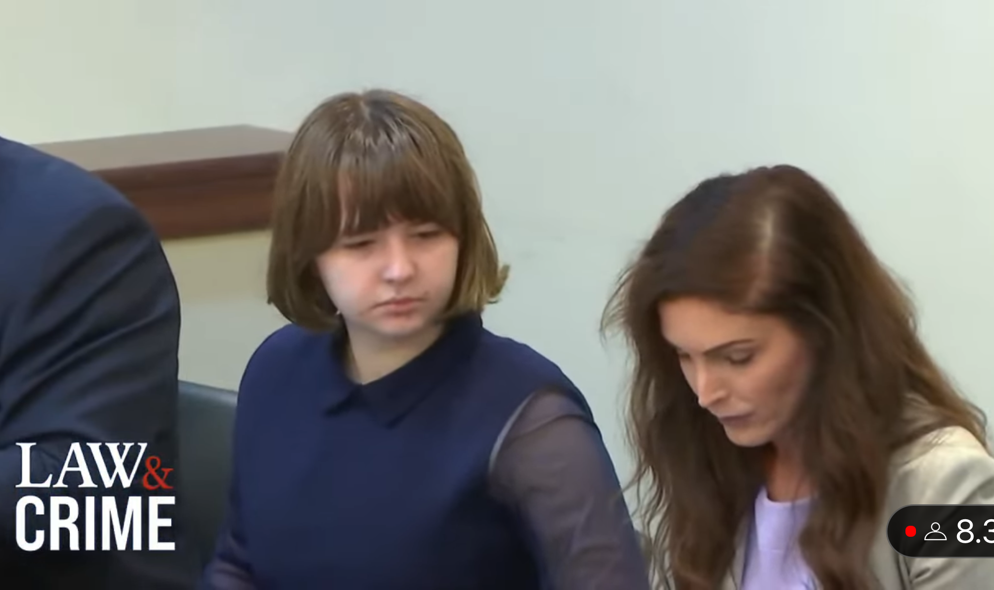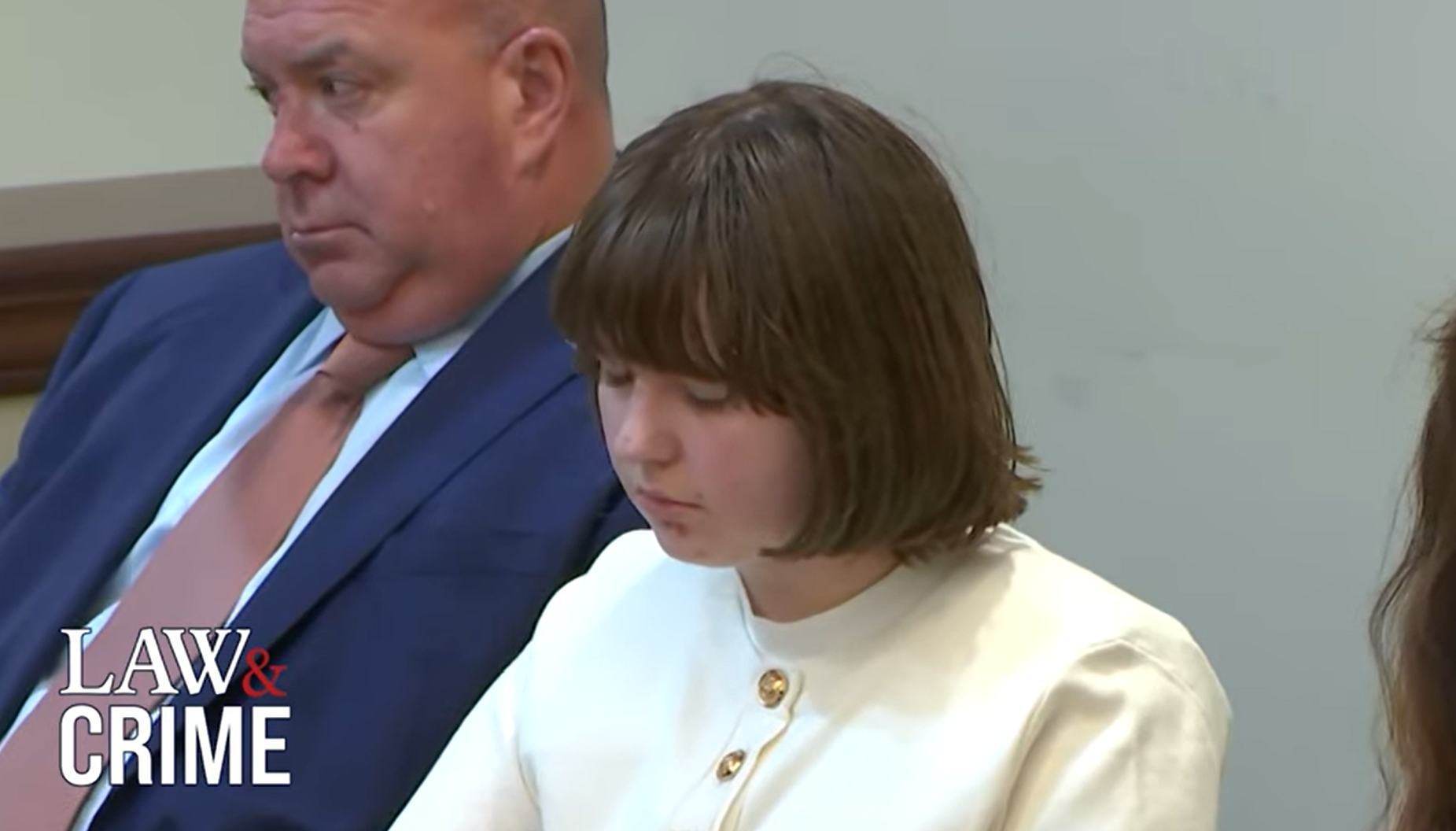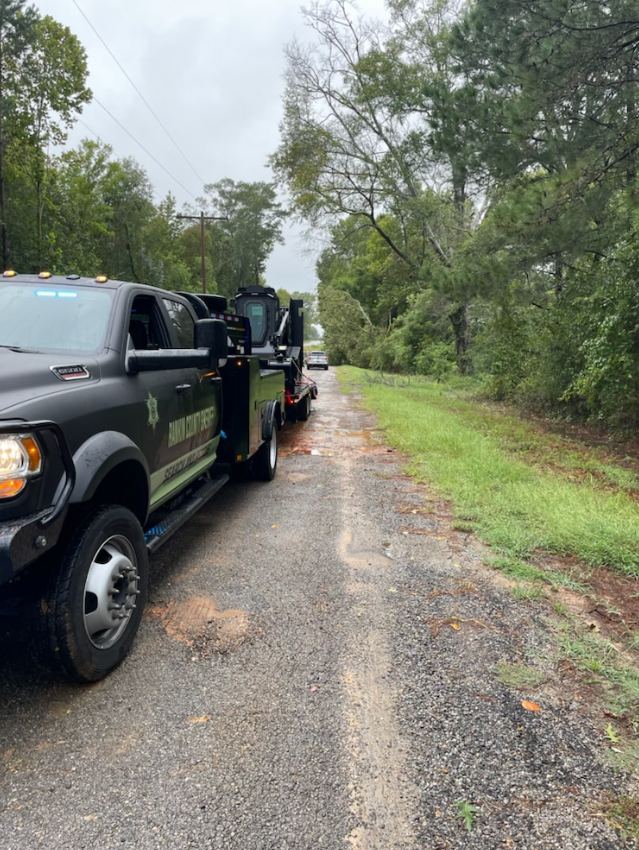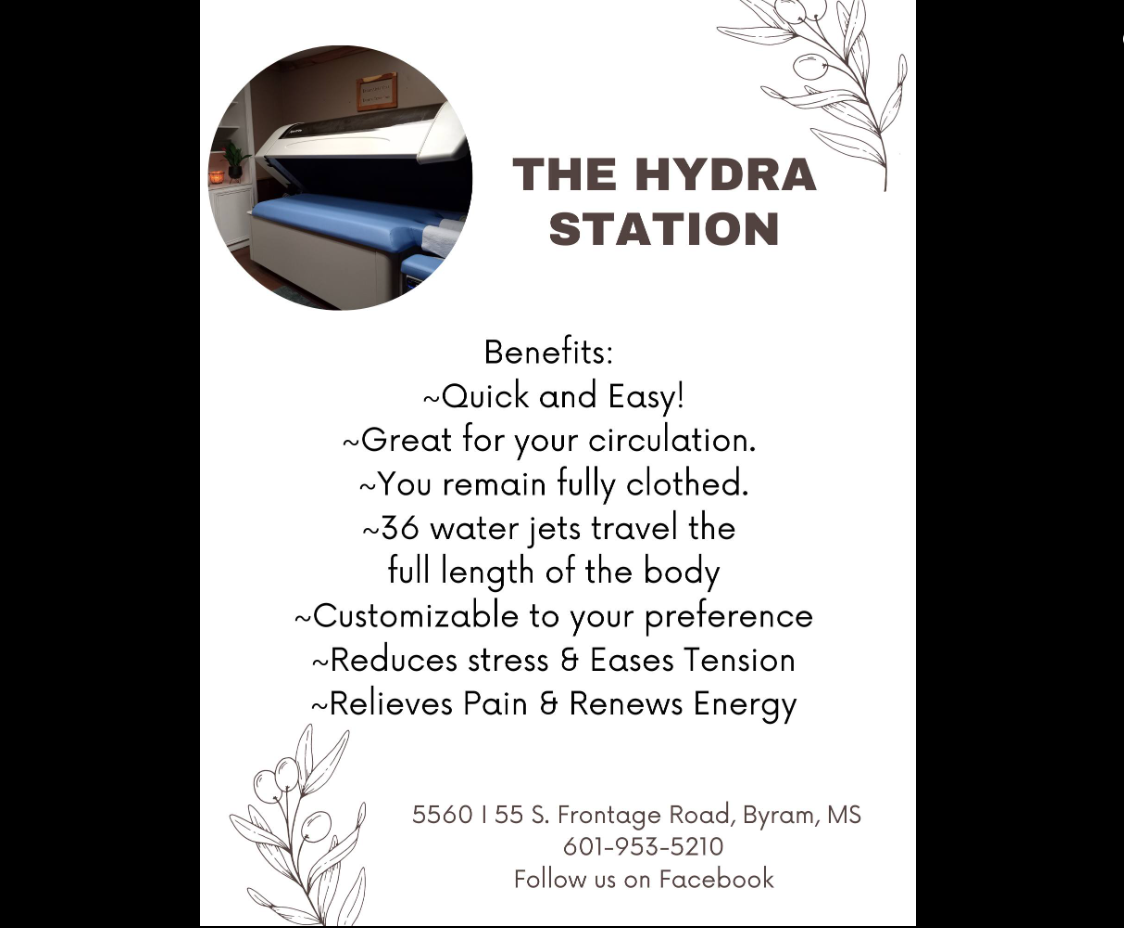All photos courtesy of Law & Crime’s live feed of the trial.
Testimony resumes today in the murder trial of teenager Carly Gregg, accused in Rankin County Circuit Court of fatally shooting her mother, Ashley Smylie, and then shooting her stepfather.
On Tuesday, the jury witnessed a home security video that shows the exact moment that Gregg allegedly shot Smylie and then came into the kitchen, apparently to text her friends.
On Tuesday afternoon, Investigators Tyler Burnell and Zachary Cotton, as well as employees of the State Crime Lab, testified to the incidents surrounding the homicide and the arrest of Gregg and the subsequent investigation into the evidence.
The State rested.
Court resumes at 8:45 a.m.
DAY 3 COVERAGE BEGINS HERE:
Before the jury is seated, Judge Dewey K. Arthur advises Carly Gregg that she can testify if she wants and that it’s her decision, but that no one but her would have to live with whatever decision she makes. At that point she said she’d choose whether or not to testify when she sees what further testimony bears out.
JUVENILE WITNESS
The defense’s first witness was called around 8:50, and was a juvenile. The live feed is muted during the testimony of minor witnesses to protect their identity. We will fill in these blanks as soon as we can.
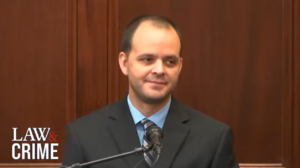
HEATH SMYLIE BACK ON THE STAND
The defense brings Carly Gregg’s stepfather Heath Smylie back to the stand. Starting off on Wednesday, Smylie talked about Carly’s relationship to himself and Ashley Smylie. Following defense questioning, he testified that Carly appeared very happy with their wedding, then detailing the adoption of their two golden retrievers, and how the second one was a surprise for Carly.
Defense Attorney Bridget Todd asked Smylie about how his family usually spent the weekend, and he said usually they’d spend time with family or each other, and that sometimes he would play video games with her, or she would go to karate or guitar lessons. He talked about how she had multiple guitars and would play them for the family.
Todd went on to ask more questions about the two dogs, asking Smylie if he had photos from the day the second one was adopted. He detailed two pictures taken from that day, one of him and Carly, and one of Ashley and Carly.
Then he was asked to talk about another photo of Ashley and Carly and the second dog, Finn, then one of himself and Ashley and their first dog, Wyatt.
The State objected to the photos as to relevance, and it was overruled.
The last photograph the defense wanted to discuss was a June 2020 photo of Ashley and Carly taken by Heath.
On cross-examination, the State asked about Ashley’s appearance in some of the photos, and then asked him if it were accurate to say no one would be seeing Ashley again after March 19, 2024 because of Carly’s actions. He agreed. Then holding up a photo from 2020, the prosecutor asked if Carly looked any different than she had four years ago, and Smylie said he didn’t really see a difference.
The prosecutor asked if Smylie had testified before that where Carly shot him was about six inches from his head, and he said yes.
On redirect, the defense asked if Smylie thought Carly had changed dramatically since the photos were taken four years ago, and he said no, not except that her hair was different.
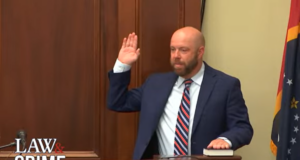
DEPUTY TONY SHACK
Interdiction Deputy Tony Shack was called to the stand to discuss his participation in the search for Carly Gregg. He said he had gotten the BOLO and as he was coming down Farmington Blvd, and looking to his right, he saw a female standing there and he stopped and asked her if she was involved in the incident. She said, “Yes sir, is my stepdad okay?” and Shack told her he just had to take her in custody.
He said he was told first to take her to the scene, then to the office, then to the scene.
Defense attorney Kevin Camp asked Shack if there were a time that he had muted his body cam, and Shack said that yes, there was. He said he had muted it because there was discussion of an employee who had been directing him back and forth from the scene to the office.
Camp asked if Shack was in charge of Gregg’s custody at the time the body cam was muted, and he said yes, but that other detectives were with her at the time. Camp asked if there were ever a time that deputies are allowed to mute their body cameras, and he said no, but that his muting it was not related to the investigation, but rather a personnel matter.
The policy, Shack said, is that you remain with the body camera on when working with the public or a suspect.
“You’re supposed to carry it on at all times while the case is going on but I was talking about something else, which is why I muted it,” he said.
Camp asked Shack if Gregg had asked to see her mother, and Shack said he didn’t recall that being the case. When Camp pressed him, he said he didn’t know the details of the case at the time to tell Gregg anything. Camp then asked the court to put Shack’s body cam video into evidence.
After the attorneys asked to approach, Judge Arthur asked the jury to step out while the court discussed the body camera footage and how it needed to be in a format that could be played on the computer being used in the courtroom.
Court recesses for 15 minutes.
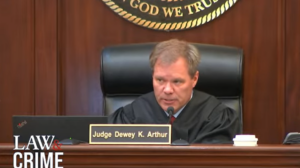
JUDGE DEWEY ARTHUR INSTRUCTS THE COURT
When the court returned from the break, the judge informed the court that certain measures had to be taken to get the body cam footage in a format they can use. Shack is excused and will be brought back to the stand when the video is formatted in a way that can be used.
The defense had just called Dr. Andrew Clark to the stand when attorneys approached the bench and the mics were muted. When they came back from conferring, Judge Arthur told the court that the discussion had been about some medical records. He then sternly that from this point on, any evidence had better already be ready, because he’s not taking another break.
“These people are getting paid $25 a day and they’re away from their jobs,” he said of the jury. “They didn’t ask for this job and they don’t want this job and I forced them into it. I’m tired of wasting their time. You have 20 minutes.”
When the break was over, there was still some paperwork that apparently wasn’t ready, so Judge Arthur asked if Shack could be brought back to the stand, but he was still reviewing the body cam footage in its new format to make certain that it was accurate. The defense said it just needed a few more minutes, and the Judge said, “That’s still a few minutes. Does the defense have a witness they can call right now?”
The defense said there was not, and that Dr. Clark is the last defense witness. There was a question of a journal, and the court did not have the journal in its entirety at the moment, keeping the defense from being able to call the doctor. An exasperated Judge Arthur told the attorneys to make sure the TV worked before he called the jury back in and then had to send them back out again.
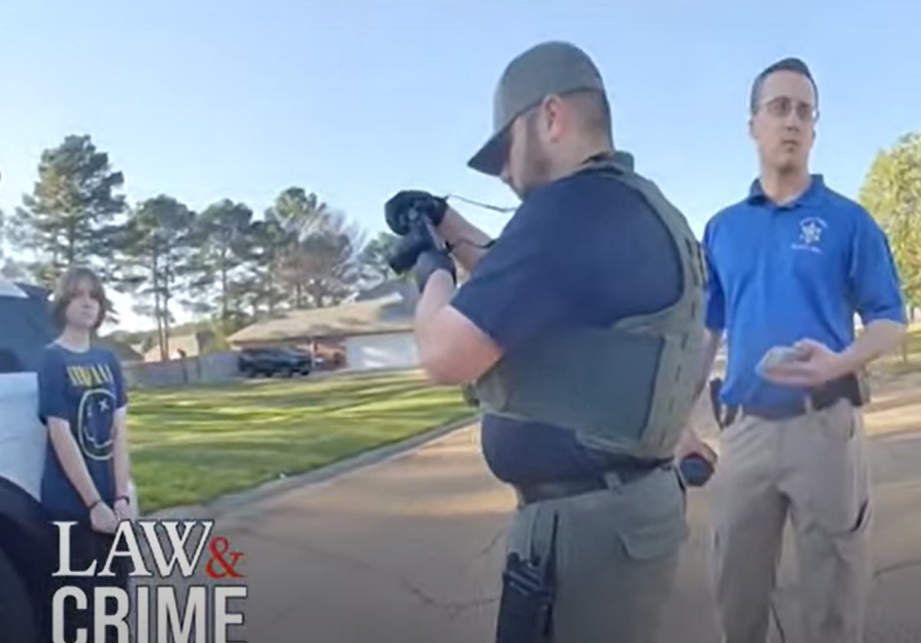
DEPUTY TONY SHACK RECALLED
The court watches Deputy Tony Shack’s body camera footage, which starts off muted as he is driving, then he unmutes it to talk on the radio about where he found Gregg in Farmington and how he’s been directed “in a merry-go-round.”
“What do y’all want me to do with her?” he asked, detailing that he’d been sent to both the scene and to the investigations department.
The video shows Shack, now out of his vehicle, talking with another deputy. He can be heard saying Gregg told him, “I didn’t mean to.”
Then he instructs the other deputy on how to use a gunshot residue kit that they open there on scene. They let Gregg out of the vehicle and cuff her in the front so they can administer the kit.
“I’m not going to ask you a bunch of questions, but obviously you fired with a pistol, correct?” Shack says. She says yes. Then she asks what is going on, and he tells her it’s a GSR test, then asks which hand she shot with.
“Is my stepdad okay?” she asks. Deputy Ronnie Decell responds, “I don’t know baby, I can’t talk to you about that.”
One of the deputies asks her if she’s okay.
“She doesn’t even know about her mom,” Shack says.
The camera was then muted, and Camp asks Shack why, right before the video was muted, Shack was talking about “Carly doesn’t know her mother is dead.”
Shack explains that she had never asked about her mother, and that he didn’t know about the details of the case. He then muted the camera to talk about driving around in a circle, which Camp questioned again and Shack describes that on video, another deputy could be seen shrugging his shoulders in response to the discussion about being sent in circles.
Camp then hands Shack a Sheriff’s Department manual of policies and procedures, and asks him to read different passages out of it. One passage says the body worn camera can’t be turned off during the event, and Shack says yes, but he had muted it instead of turning it off while talking about the personnel matter.
The testimony continues with Camp asking Shack about procedures and reports, trying to bring out ways that Shack failed to do his duty correctly by muting his body camera.
“Your policy says you’re supposed to make an entry whenever you interrupt your body camera,” Camp said. “Show us in your report where you did that.”
“Yeah, it’s not in there,” Shack said.
After introducing the policy into evidence, the defense tendered the witness.
The body camera footage continues, and Shack can be heard telling other deputies about finding Gregg. Meanwhile other deputies are taking photos of her next to Shack’s patrol car.
Shack says Gregg said, “I’m so sorry, I’m so sorry.”
In the cross examination, Assistant District Attorney Michael Smith clarifies with Shack about a conversation that can be heard on the camera where Gregg was giving him directions to her house.
“Were you frustrated that they had you on a merry-go-round,” Smith asked Shack, and he agreed.
Smith then asked about Shack’s muting his camera, asking if he ever muted it in Gregg’s presence, or with any other suspect, and the answer to that was no.
“Did Miss Gregg ever say anything to you or ask anything about her mom?” Smith asked. Shack answered no.
Smith asked if she said that she had fired a pistol and if she had fired with her right hand, and he said yes.
Shack said once he had dropped Gregg off, he watched the GSR test and talked to other deputies, but that was the extent of his involvement on scene.
Shack told the court that he was in traffic when he saw Gregg, and he threw the car in park in the middle of that traffic to get out and talk to Gregg. When he ascertained that it was her, he put her in the car, and that’s when he thought to turn on his body camera. He said he didn’t think to turn it on at that time because he was in a hurry to stop backing up traffic.
On redirect, Camp reinforced with Shack whether Shack thought it was okay to mute the camera, and Shack said at the time he had thought it was okay to mute it while talking to other employees about a personnel matter.
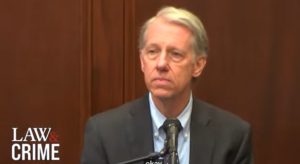
DR. ANDREW CLARK
Medical and school records, a sketchbook and a journal, and the doctor’s CV are admitted into evidence by stipulation prior to Dr. Clark’s testimony. Expert witness Dr. Clark is a psychiatrist from Cambridge Massachusetts who does both private and forensic work after being a professor at Harvard Medical School. He has a long resume in the medical profession, teaching, and practicing psychiatry and forensics.
Just after the court qualified Dr. Clark as an expert, the jury was released for lunch.
On Todd’s prompting, Clark says that he became involved in the case when invited by attorney Kevin Camp. He said he wanted to review certain documents about her treatment and police reports before he agreed to take the case. He said he was also sent a journal and a sketchbook.
Clark said he wasn’t sure he could be helpful, but he came to Mississippi to interview Carly Gregg in August at the Rankin County Correctional Facility. Not long after, he did a 90 minute interview with Heath Smylie, he said. Clark said he also spoke with Carly’s maternal grandmother but that he did not include it in his report because he “didn’t rely on it.”
Clark said he couldn’t determine ultimate fact in the situation, but that he felt his research and opinion could help guide the decision makers. That information, he said, is in his report. His conclusion was made based on his training and experience and familiarity with the literature, he said, but also on his research and interviews.
Carly is bright, loved school, loved to read and thinking big thoughts, she was a loyal and generous friend, a follower rather than a leader, a complicated and close relationship with her mother and a close relationship with her stepfather and a much more complicated relationship with her father, Clark said.
“It was my impression that Carly had always to a very large extent been well behaved,” he said. “And then in the last year developed some what I took to be relatively common teenage behaviors, such as staying up past curfew on a burner phone to talk with friends.”
SMOKING MARIJUANA, CHILDHOOD ISSUES
In the last 6 weeks prior to the arrest, he said, she had started smoking marijuana.
Carly had a difficult childhood, Clark said, citing a younger sister who died of a medical situation when Carly was 4 years old. Her parents’ divorce came around that age as well, Clark said, and she could recall seeing her mother bruised as a result of domestic violence, though she never saw the violence. She remembers her mother and her leaving her father late at night, Clark said.
Carly found her father to be angry and unreliable during her visits with him, Clark said, and he would sometimes not let her have food or fluid. She told Clark that her father was a dangerous driver and she was afraid to ride with him.
Clark said Carly was a good student with good grades and test scores and had skipped the fourth grade. She liked to learn and was happier with the more challenging fifth grade, she told Clark.
There were two or three incidents at school, Clark said, including when Carly brought a knife to school and was sent to an alternative school as a result. Her therapist said, according to Clark, that she felt that it was “much ado about nothing.” Carly took some responsibility to help teach the class at alternative school, Clark said.
The doctor said he had read descriptions from Gregg’s friends that she was a follower, and there was a story of drinking hand sanitizer on a dare. He said he took that as an example of bad judgement.
Clark said when Gregg was 6-9 years old she was unhappy, dealing with the divorce and her father, as well as the death of her sister. Clark said that there were a few occasions where she had intrusive memories of times with her father, her therapist had noted, and that around age 6 to 9, she started hearing a male voice that would say things like, “You’re better than them.”
She began to feel distant from the world as if she were in a dream at that time, Clark said.
Clark said when he said, “intrusive thoughts,” that he means memories of trauma that come back. This can be a symptom of post traumatic stress, but Clark said he’s not diagnosing Gregg with PTSD.
Around the age of 9, Gregg said she continued to hear voices and felt that the world wasn’t real, and then around 11 or 12, she began to cut herself on her things as a way to help manage her anxiety and stress, Clark said. Cutting is something some teenagers do to cope with feelings that are too much to handle, he said, and is a reflection of mental health struggles. Her parents learned of this around December of 2023, he said.
DECEMBER 2023 AND AFTERWARD
At that time, Gregg’s parents also found out that she was using an old iPad or iPod to text friends, particularly a boyfriend, Clark said. In the summer of 2023, she also reported that she had trouble falling asleep and would wake up in the middle of the night. She had started to take melatonin to deal with it. When 5 milligrams didn’t work, she started to take 10 milligrams and her mother was concerned about it. When Gregg told her mother she was depressed, Ashley Smylie got her involved with a therapist.
Melatonin is a natural substance considered safe to use as a sleep aid.

There were two parallel treatments going on, including psychotherapy with a therapist that she liked much better than the therapist she had when she was younger. She met with a prescriber in January that diagnosed her with major depressive disorder, or depression, and put her on Zoloft, Clark said. When Gregg told them she didn’t think the Zoloft was doing much, they increased her dose, Clark said, but her dose was still well within a normal limit.
Gregg told Clark that at the 50 milligram dose she didn’t feel much of anything, but that she was somewhat numb. Clark said that is normal for some people taking Zoloft. She described herself as feeling “zombied.”
Then the clinician changed her medication to a small dose of Lexapro, Clark testified. Gregg was told to taper off the Zoloft but she stopped abruptly and started taking the Lexapro.
Gregg began smoking marijuana at school about six weeks before the shooting, Clark said, and she told doctors she was smoking three to four times a week. Clark said he thought the marijuana could have affected Gregg’s symptoms by affecting her academic performance and could have put her at odds with some of her friends who don’t agree with smoking.
It didn’t seem to affect her scholastic performance, Clark said, though on March 19 she woke up grumpy and couldn’t focus on schoolwork. She didn’t smoke marijuana that day, Clark said.
“I think Carly was struggling with a significant mood disorder,” Clark said, adding that the treatment wasn’t very effective.
Hypomania is a condition that is an elevated mood similar to that in bipolar disorder but not as extreme, Clark said. With bipolar 2, treating it with an anti-depressant can make it worse, Clark said, and he asked Gregg if she had hypomania of some kind. He said he understood that her father may have bipolar disorder. So a teenager in a depressed mood with a parent with bipolar has a much higher risk of bipolar disorder, he said.
Clark said Gregg told him that she has clear states of agitation and recklessness, including one time when she got a nipple pierced. She told him she spent about 60% in a depressed state, 20% in a hypomanic state, and 20% in a normal state of mind.
Looking at medical records from Gregg’s clinician, Clark explains that in a pre-screen questionnaire Gregg responded “yes” to questions about being in a consistent depressed state for two weeks and feeling suicidal. She also responded yest to questions about being in a heightened, almost manic state. To the question about extreme anxiety in situations others find normal, she also answered yes.
Clark said there were questions such as, “In the past month have you been bothered by intrusive or distressing thoughts,” Carly said yes. “Have you repeatedly done something without being able to resist doing it?” Yes. “Have you ever dealt with an extreme life or death situation?” Yes.
Clark said her previous doctors had not asked Gregg about mania and had prescribed antidepressants anyway.
Carly had told Clark she was worried that she would turn out like her father, and that her mother had said something like, “You might end up to be like your father.”
A lot of teenagers won’t be forthcoming with their psychiatrist, Clark said, out of concern that they could end up in a mental hospital or that their parents will find out. He said it’s a very big deal for most people to have to think about being diagnosed with any kind of psychosis. Gregg told Clark that she’s able to put on a good face and people don’t always know what she’s feeling.
“I understood Carly from a very young age needing to be aware of her mother’s mental state, making sure that her mother was okay,” Clark said. “I think the fact that she’s bright helped her with that.”
She leads with the idea that she’s just fine, Clark said, and minimizes and denies her mental problems.
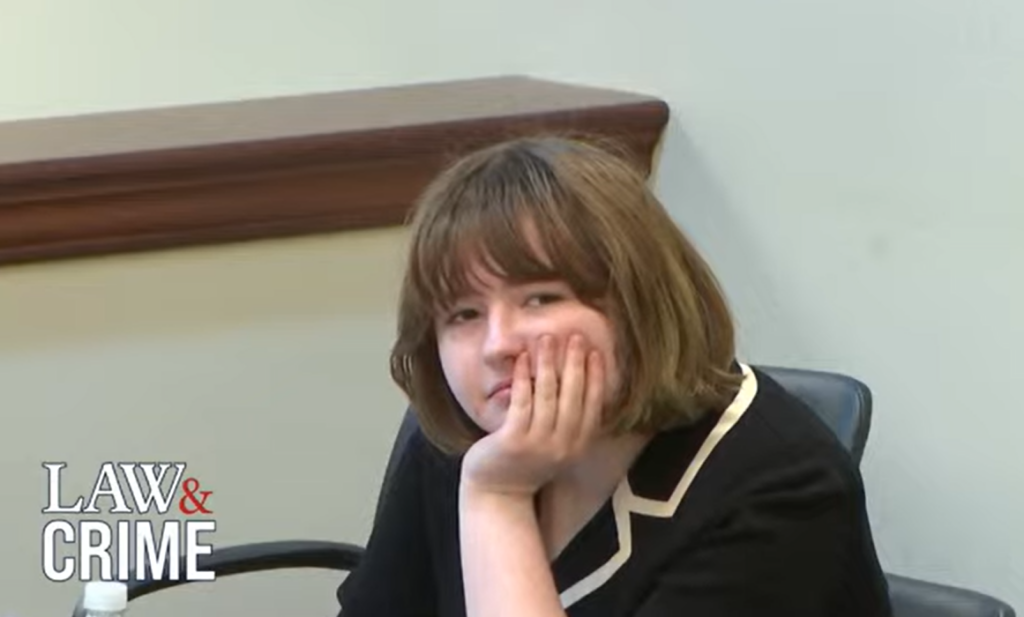
PSYCHOTIC BREAK?
Clark said depression doesn’t commonly have auditory hallucinations, but manic episodes do. On March 12, one week before the incident, Gregg wrote in her journal “I think I had a psychotic break earlier. The whole ordeal was quite silly really, I spoke with one of the voices in my head… my particular friend and I were screaming bloodthirstily and ravenously.”
She adds that she’s not sure if she’s going to bring her journal to her therapist or not. Clark said the journal started in January, but had dropped off. The March 12 entry is the only one in March.
Carly’s sketchbook had an entry that Clark said he didn’t know what to make of, but it raised disturbing questions. It was a sheet of paper written in green ink in a different handwriting than Carly’s, written like a soldier with a different name. “Anyhoo, I don’t think I’ll make it any longer.” Then it becomes larger and more primitive, and it says, “Please help me, please help me, I don’t (something), I’m sorry.”
Clark said he spoke with Heath Smylie and he said he and Ashley Smylie had found a hidden journal full of dark themes and asked her about it and she said she couldn’t remember it. Again, some of the writing was in different handwriting.
One of her writings that Clark read out loud had themes to the effect of, “I’m a schizophrenic person, I miss being sane, I just wish I could find true love and then I could be normal.”
“I don’t know if these are just the writings of a normal somewhat dramatic teenage girl. I do know she’s worried about her mental health at this time,” Clark said.
Schizophrenia can manifest in the teens, Clark said, and many of the symptoms are similar to those exhibited by Gregg. It is the most catastrophic of all psychiatric diagnoses, Clark said.
Clark said Gregg told him she had also restricted her eating at times and engaged in binging and purging.
Clark continued his recitation of problems that Gregg could have by talking about dissociation, including a kind that can cause a person to do things and go places without knowing. It can be caused by trauma, he said.
Carly reported that the voices were getting worse and more urgent and prominent in the week before she allegedly shot her mother, Clark said.
“Her mood is poor, the voices are getting worse, she’s sleeping bad, she’s smoking marijuana,” Clark said.
Several things stood out in records sent to Clark after his interview with Gregg by Vital Core. One thing was that the voices had become commanding, which is very concerning, Clark said. He had asked her several times whether she was having command auditory hallucinations, so he said he was surprised to see that report. He said the hallucinations were telling her to hurt her mother. He said they stopped in May when she was taken off her Lexapro, he said.
She was also put on an antipsychotic, Abilify, when she got to jail, Clark said. Subsequently, he said, Carly reported that the voices were gone. Clark said the dosage she was on was much stronger than what he usually prescribes to adolescents dealing with psychosis.
“It’s rare for me to see teenagers on that significant dose,” he said.
The significance of that, he said, was that Carly had reported the hallucinations that had told her to hurt her mother and Clark found it striking that she was denying and minimizing the hallucinations. He wondered if she could be making it up since she’d been arrested.
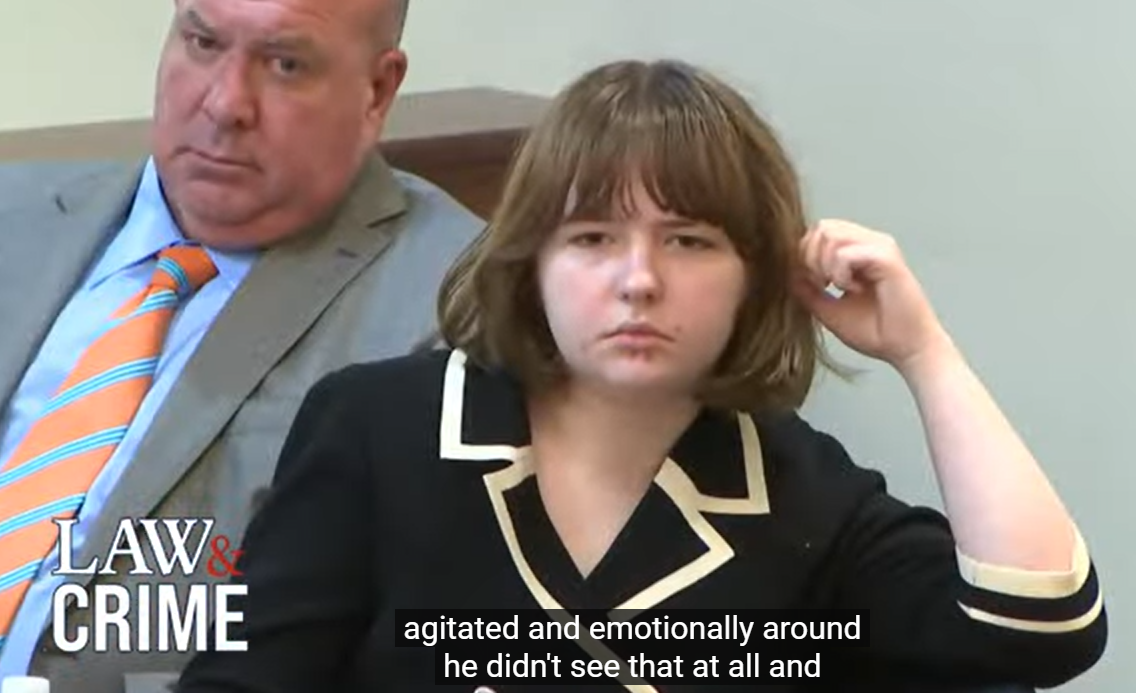
“I was thinking if she was malingering, she’d be leading with this. ‘The voices told me to do it,'” he said.
Clark said that Gregg told him that since she’s been on Abilify, she feels much better and isn’t dealing with the hallucinations anymore.
Clinicians also said Gregg had been crying every day from April into June, then since July or August she’s been better. She still misses her mother, Clark said, but she’s doing better.
“The pattern this represents is called bipolar depression,” Clark said. “When someone with bipolar disorder has mood elevation… it’s followed by a crash.”
It’s possible that her situation caused the moods, but what struck Clark, he said, was how distraught she was versus how much better she felt. “It’s likely there’s a biological component to that,” he said.
Aside from her mental health conditions, Carly was a normal teenage girl, Clark said. When Todd asked him if he would classify her as “callous,” he said he would say she’s probably the opposite. Asked if she was “diabolical,” Clark said he would not, and that he would probably not ever describe anyone with that term.
LEXAPRO?
Clark said Gregg told him that her mood swings became worse when she was put on Lexapro. She said while her parents were out she smoked marijuana and there was a period of time that her thoughts were jumbled and racing and that she fell to the floor because she was afraid she wouldn’t be able to control her body. It passed after about 20 minutes, she said.
Clark said SSRI medications are generally considered safe and most adolescents do fine with them, but a small number of individuals have a dramatically bad response to them. Most of those responses are suicidal and come from out of the blue. That’s what a “black box” warning is about, he said, when you see a warning in on those kinds of medication, usually aimed at people ages 16 to 24.
With bipolar issues, an antidepressant can also aggravate the mood swings if they’re not taking a mood stabilizing medication like Abilify, Clark said.
ON MARCH 19
Clark said Gregg told him that she woke up angry and irritated that day, and that she typically got a ride home with her mother. When she went to her classroom that day, Ashley Smylie told her that she knew she was smoking marijuana. She didn’t necessarily know someone had told her.
When they got home, Carly said she can’t remember what happened after she let the dogs out. Her memory allegedly resumes when Shack finds her on the side of the road, he said.
A friend of Carly’s said Carly had told her she was hearing voices prior to the incident.
On the body camera footage, Clark said what stuck out to him most was her asking how her stepfather was. He said Carly told him her mood was stable for the first time in years, that she missed her mother very much and had been having a very difficult time since her mother had been killed.
DIAGNOSED MOOD DISORDERS
Clark said he diagnosed Gregg with multiple things.
Gregg was diagnosed with Bipolar 2, worsened by the Lexapro medication from March 12 onward.
Diagnosed with a type of schizophrenia as a result of the auditory hallucinations. “I think it’s reasonable to conclude the voices weren’t just telling her ‘Oh you’re better than that guy,'” Clark said. “When the voices become more urgent, they typically say something much more concerning.”
Gregg had persistent low grade dissociation for years, he said, so he also diagnosed her with some dissociative disorder. Some people don’t know that they dissociate, he said.
Transitioning off of Zoloft shouldn’t have affected Gregg’s behavior to worsen a mood disorder, Clark said. Gregg told him she didn’t have any withdrawal, he said.
“Carly was at that point really in a mental health crisis, having significant mood swings made worse by the Lexapro, the voices were more and more of a problem, she had documented on March 12 that the voices were a problem, she was having these dissociative episodes, and that day she couldn’t pay attention to school, which I take as a symptom of her worsening situation.”
Clark said her mother’s learning of her marijuana use could have triggered a dissociative state because she cared so much about her mother’s approval. She still could have made phone calls and texted friends and sat in her desk at school regardless of a dissociative state, Clark said.
Many people that engage in violent acts say they were dissociating, Clark said, and the question is how many are just trying to avoid blame or can’t stand to think about what they’ve done.
Sudden significant stress, a history of dissociation, a close reaction with a victim, no prior planning or threats, and the absence of criminal or antisocial behavior are consistent with a real dissociative reaction rather than someone just making it up, Clark said, and Gregg fits all of them. There’s usually patchy amnesia with dissociation, which is the only thing that doesn’t fit with Gregg’s claim that she has no memory of the events.
CLARK’S HYPOTHESES
Clark said he gathered the information and did not try go come to a conclusion, but puts a hypothesis together from the pieces. He said two hypotheses that he ruld out was that Carly could have just panicked. She’s emotionally fragile and in the moment she just panicked and did something violent, he said. What changed his mind was how calm she was on the surveillance video from the kitchen, he said.
In this plan to shoot her stepfather, why in the world did she plan to shoot her stepfather, Clark said. Why would she invite friends over? Her emotional flatness didn’t fit, he said.
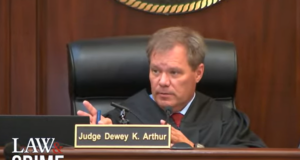
The other hypothesis was that she’s just callous and thought her mother deserved it. The problem with that hypothesis, he said, was that so much of what she did seemed senseless, like putting the video camera in the refrigerator. Planning to shoot Heath Smylie and invite her friends over makes no sense if she was just callous, he said.
“Nothing about this looks like a well-planned out scheme,” Clark said.
Clark said Gregg’s understanding is that she doesn’t remember but she thinks she must have done it.
“We know that she cared about her mother, we know that she cared about her stepfather, we know that she cared about her friends,” Clark said. “…That’s what doesn’t fit the psychopathic model.”
Todd asked if Carly were able to understand her conduct and right versus wrong at the time of the incident. Clark said he didn’t think so. He said that in his opinion, she did not understand the nature of what she did at the time.
AFTERNOON BREAK
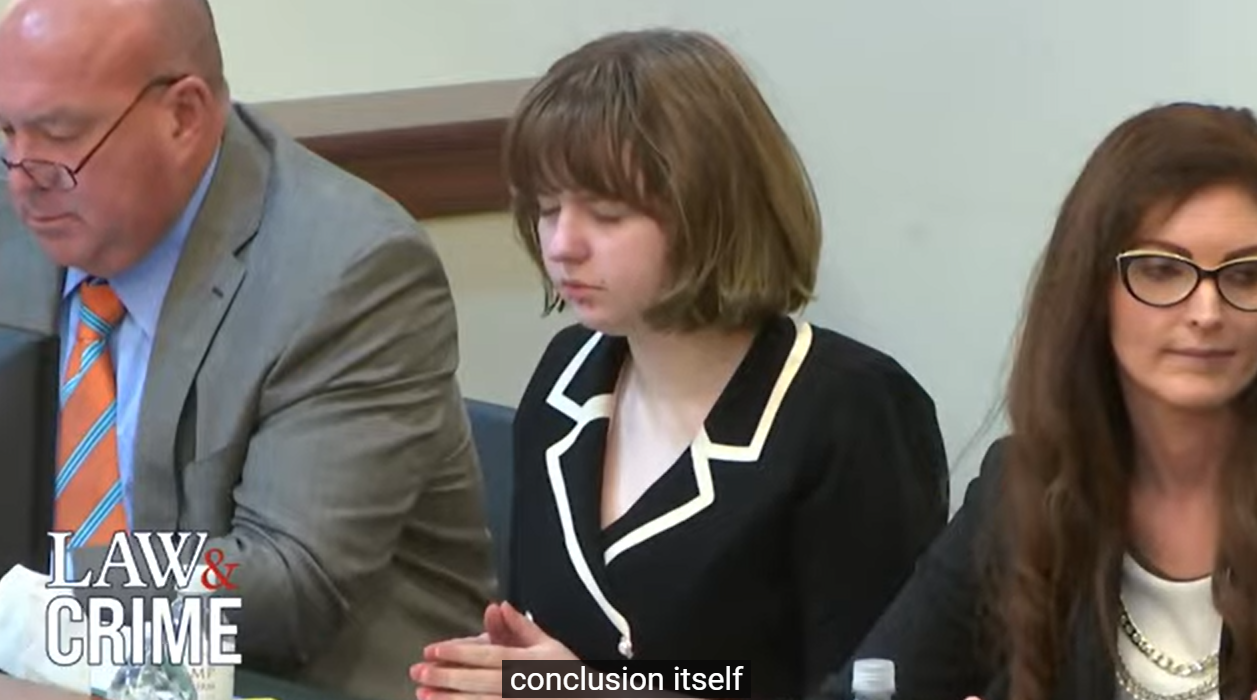
Coming back from the afternoon break, the State asked to disqualify Dr. Clark’s testimony since he had not offered an opinion to a reasonable degree of medical certainty. ADA Michael Smith said since he had not done so, anything that the prosecution asked him would simply set the defense up to knock down during redirect when there wasn’t an actual certain medical direction of the testimony beyond a discussion of various mental illnesses.
The court is now reviewing case law to make a decision on the motion.
During the discussion, Gregg could be seen with her eyes closed and her hands pressed together as though she were in prayer.
“We can’t unring the bell. The jury has already heard the evidence,” Arthur said, adding that Clark had given something of an opinion toward the end of his testimony. “The court is going to overrule the motion to exclude.”
CROSS-EXAMINATION
On cross-examination with Smith, Clark said he was retained around August 24, and five days later evaluated Gregg. Four days after that, he rendered his opinion.
Smith asked him what he does to familiarize himself with the standards of each individual state that he is testifying in as an expert, and Clark said he had learned that from Camp, as well as doing internet research.
Clark said that he had evaluated Gregg for about 4 hours with Todd present but had never treated her or reviewed any of her records until sometime after August 24th.
Smith asked if Gregg knew who she was, and she did, Clark said. Smith asked if she were dissociated while talking to Clark. The doctor said that she had said that she still feels somewhat dissociated when she was having evaluations or going into court.
Clark told Smith that Gregg knew why she was meeting with Clark and that he was doing an evaluation for the attorneys.
Neither the evaluation with Gregg nor the one with Heath Smylie were recorded other than in Clark’s notes, Clark said. He did not provide the notes to the defense, nor was he asked for them, Clark said.
“So in forming your opinion in this case, you relied on your memory and the notes that you took, and then the other documents,” Smith asked. Clark agreed that yes, that was correct.
THE EVALUATION
Clark told Smith that he had reviewed the video from the kitchen and the video from the garage on March 19. He did not see the videos leading into the shooting of Ashley Smylie, Clark said. It was no more than 20 minutes total of videos, he said. He also said he had reviewed police reports of Gregg’s texts, though he’d never seen the actual texts.
Smith asked if it would have been helpful to see the actual texts, and Clark said it might have been, yes.
Clark said he interviewed one of Gregg’s friends that she contacted after the shooting. He said he had been friends with her for a few years, and that she hung out with the smart kids and that he wasn’t in that group. He said that around February their communication had started to drop off. He said he became aware of her smoking marijuana in March, and he decided to tell her mother and did so on March 19.
Clark said that same friend had been contacted by Gregg, who Facetimed him, but that it was too late to do anything.
“Carly knew and recognized him at the time, correct?” Smith said, then ascertaining that Carly had reached out to him between when she shot Ashley Smylie and when she shot Heath Smylie.
Smith asked Clark if Gregg had said she chooses not to meet with mental health, quoting a document that says that she does not find it helpful. 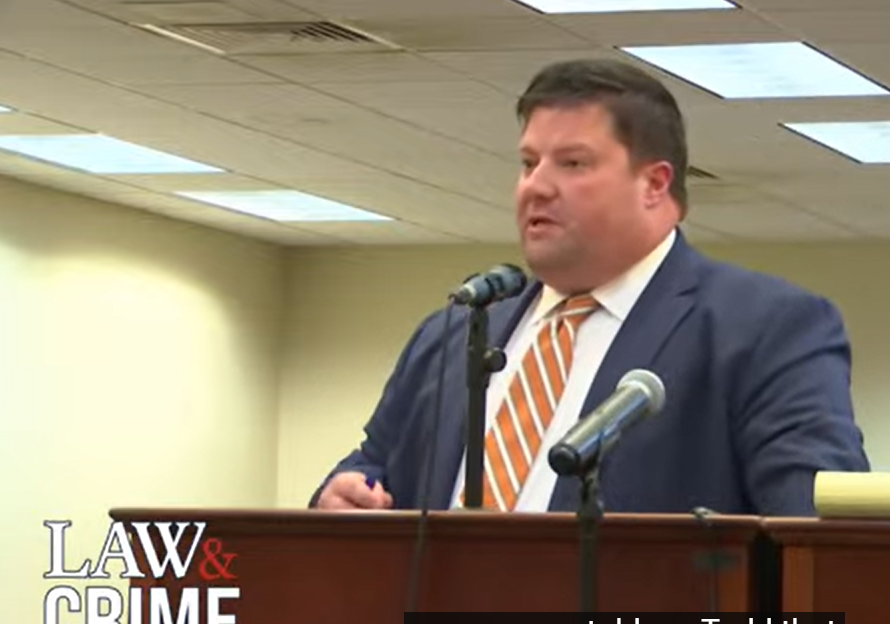
Clark said he didn’t know to what extent Gregg knew or believed that she had killed her mother or what that meant to her, but that she had gotten more sad as “reality started to set in.” Smith continued to point out places in the testimony and evidence that it had seemed that Gregg knew at the time that she had killed her mother, such as her apologies to Shack at the scene, or her asking how her stepfather was.
“I don’t know what she knew at that point in time,” Clark said.
“And that’s because we can’t get inside someone’s head,” Smith said.
“I do my best,” Clark said, laughing.
Smith pointed out the common theme that Gregg had not found therapy helpful through the years, and then asked about whether Clark had ever interviewed Gregg’s father or seen where he was diagnosed. Clark said he had seen two documents where Mr. Gregg was diagnosed with bipolar disorder.
Smith then called Clark’s attention to his testimony that Carly is good at putting a good face forward.
Another point of reference for Smith was that the doctor had testified that Gregg said she couldn’t remember anything from when she let the dogs in to when Shack found her, not before that, and not after that.
“Do you see how from this side that could seem convenient?” he asked. Clark said yes, he could.
If you don’t have proper facts can you render a proper opinion,” Smith asked.
“Nope,” Clark said.
“Is it possible that people can fake a mental illness?” Smith asked.
“Yes,” Clark said.
“Isn’t it true that someone in Miss Gregg’s position might have a reason to try to fake a mental illness?” Smith asked.
“Yes,” Clark said.
Smith began to ask the doctor about the day Gregg had brought a knife to school. She said at the time that she needed to protect herself from high school students, according to one document. Another story she told was that someone had asked her to bring it to school, according to testimony.
“Carly changed her story, didn’t she?” Smith said. “She stated that her first reason for protection just seemed more reasonable, correct?”
“Correct,” said Clark.
“So in essence, she lied,” Smith said.
“Correct,” said Clark.
Smith detailed some of the things Gregg did to act out, such as getting the piercing, asking if she had ever lost touch with reality before 2024, and Clark said no, that it was safe to say she hadn’t lost touch before that.
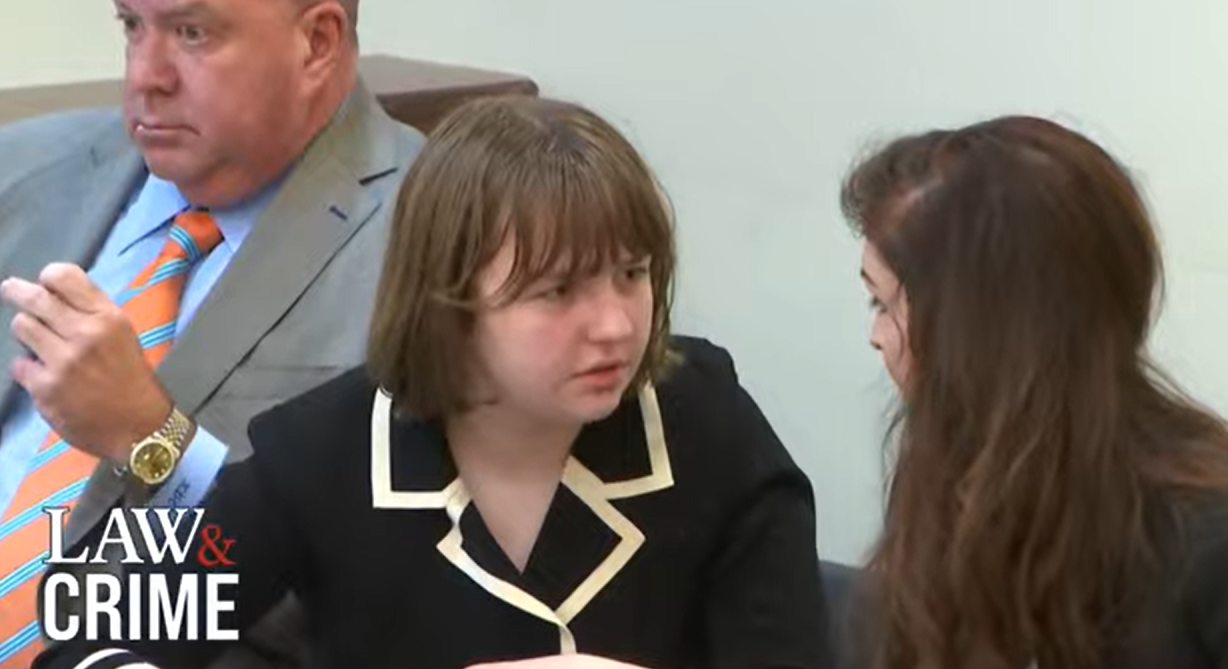
In regards to the voice in Gregg’s head, Smith pressed Clark on the early voice that told her that she was better than other people. “The first time she ever reported any command hallucinations was in the jail after she’d been arrested?” Smith asked. Clark agreed that to his knowledge, that was true.
At least until January of 2024, Gregg denied losing chunks of memory, Clark said in response to Smith’s questions.
As to the period of time between January and March, Smith highlighted that Ashley Smylie had accused Gregg of “living a double life.”
Gregg was forthcoming with those medical professionals, Smith asked. Yes, Clark replied.
“Not one time in her therapy notes with Mrs. Kirk did she say she had dissociated or heard any voices,” Smith said, adding that one document she had filled out at that time stated that she did not hear voices.
“Have you ever heard things other people can’t hear, such as voices,” the question asked, according to Smith, and Carly had answered “No.”
From January 22 of 2024 up until the shooting happened, she was seeing her therapist and never said anything about voices or dissociating, Smith said, to which Clark answered, “Correct.”
She’d never said she was zoning out, Smith said. Heath Smylie had said that, Clark agreed.
According to Clark’s notes, Gregg’s main source of anxiety was trying to please her mother, Smith pointed out, asking specifically what was Carly worried about.
“It was important to Carly that she do well in school and that her mother be proud of her for that,” Clark said, adding that the cutting and using the secret devices and smoking marijuana were things she was worried her mother would find out about.
Smith asks if Clark has any proof that Gregg had ever taken Lexapro and Zoloft other than her saying that she had, nor whether she had taken them as prescribed.
“I don’t have any proof of anything,” Clark said with a smile.
A few minutes later, Clark found a spot in his notes where he said Gragg was “generally adherent” to what was prescribed.
Smith asked Clark about March 19, Gregg woke up irritable, went to school, went to her mother’s room at which point her mother asked her if she was smoking pot and searched her bag. He details the rest of that day including the surveillance video that shows Ashley Smylie going into the direction of Gregg’s room, and Gregg takes the dogs out.
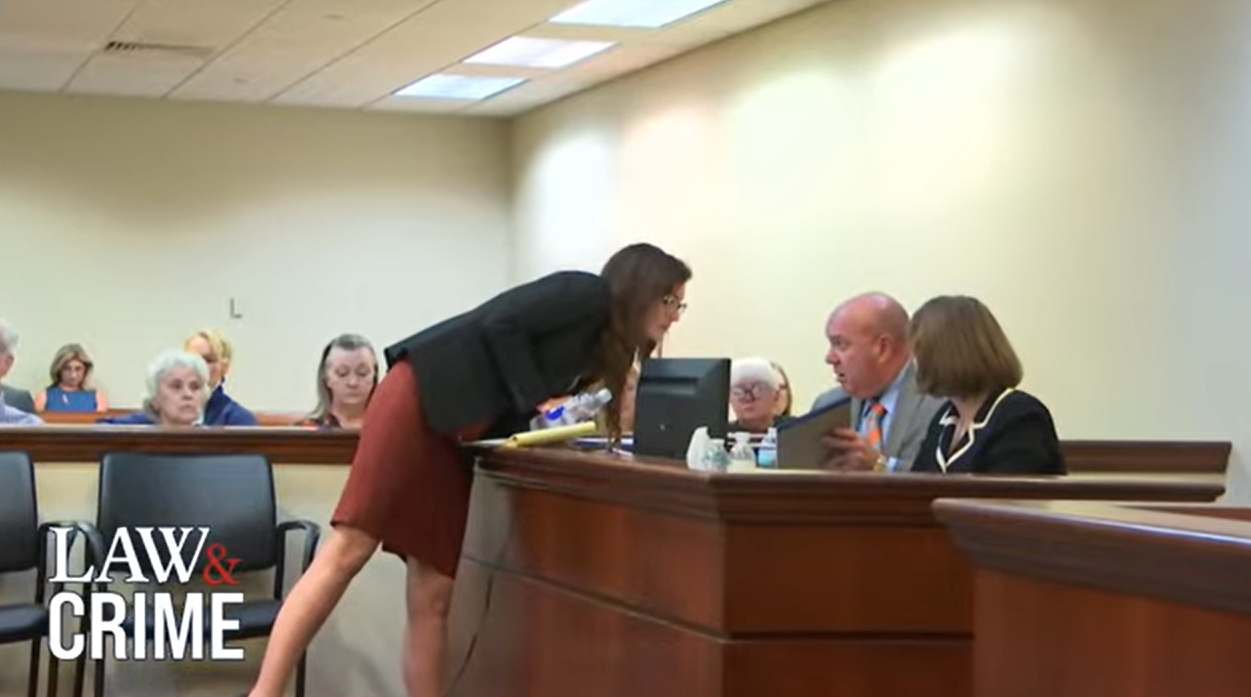
That’s when she blacks out, Smith said, and comes back to when she runs into Shack. She had some awareness that she had done something wrong, Smith asked?
“That’s what she told me,” Clark said.
“The deputy asked if she was the girl that was involved in the incident and she said yes, right?” Smith asked, adding that her assertion that she said yes because “it seemed logical” was actually not logical. Clark agreed.
HYPOMANIA?
Asked about the hypomania, Clark said he would say there is a mixed condition, similar to stepping on the gas and the brake at the same time. Smith read from the DSM-V that hypomania includes a period of heightened activity, elevated mood for four to five days and asked Clark if he were able to isolate that time period around the events on March 19. Clark said that yes, Gregg had said that was the case.
None of Gregg’s health care professionals had identified four days of elevated state, Smith asked, and Clark agreed that’s true. She doesn’t say that until six months after she’s shot her mother, Smith asks? That’s true, Clark said.
ALTERNATE POSSIBILITIES
Smith revisited Clark’s alternate hypotheses that Gregg had either freaked out and shot her mother or that she was incredibly callous, and Clark said they were both possible, but that he didn’t believe they were correct.
Asking if Gregg realized the difference between right and wrong, which Clark said she did not, Smith asked if that would still be the case considering the fact that she hid the gun behind her back from the surveillance video.
Clark said it is still his opinion that she did not. Also not when she peeked around the corner of the kitchen or when she hid the camera in the refrigerator, nor when she texted multiple friends but wouldn’t tell them what she had done? Clark said it was still his opinion that she still didn’t know the difference during those times either.
“If she had texted one of her friends and told him that she F***ed up, would that change your opinion?” Smith asked, and Clark said, “It would.”
If her friend asked if he could call 911 and she said no you can’t do that, texting her friends that she had three bullets for her mother and three for her stepfather? Smith asked.
She still didn’t know the difference between right and wrong, Clark answered.
“I think switching the medications had an impact but I can’t say the Lexapro made her do this,” Clark said.
DISSOCIATION
Smith asked Clark if dissociation is usually more of a protective measure, to which Clark said that’s how it starts a lot of times.
It’s typically the victim that has the dissociation, Smith asks, and Clark responds that there are things written about the offenders. But, Smith says, there’s nothing prior to this that says anything about Gregg dissociating.
One to two percent have suicidal reactions to Lexapro, Smith said, but what about homicidal? Clark said he doesn’t know if there’s much data to that regard.
Typically you see patchy amnesia rather than complete amnesia in legitimate dissociation versus malingering, Clark said. He reiterated in response to Smith that he did not believe Gregg to be callous, based on his four-hour interview and his interviews with family members including Heath Smylie.
Smith pointed out that Smylie is now supporting Carly, and Clark said he couldn’t respond to that since he didn’t understand the question.
Is there any type of medical literature you’re using to inform your opinion that she didn’t know right from wrong, Smith asked. Clark said yes, he was using literature about dissociation, pointing out the page in his report. The article is about dissociation in people who commit crimes, he said. Smith asked if some of her actions look like she knows right and wrong, and he agreed that they do.
Why would she ask how her stepdad was if she didn’t know if it was wrong to shoot him, Smith asked. Clark answered that the blackout was not complete because she clearly had some level of awareness in what she was doing.
REDIRECT OF DR. CLARK
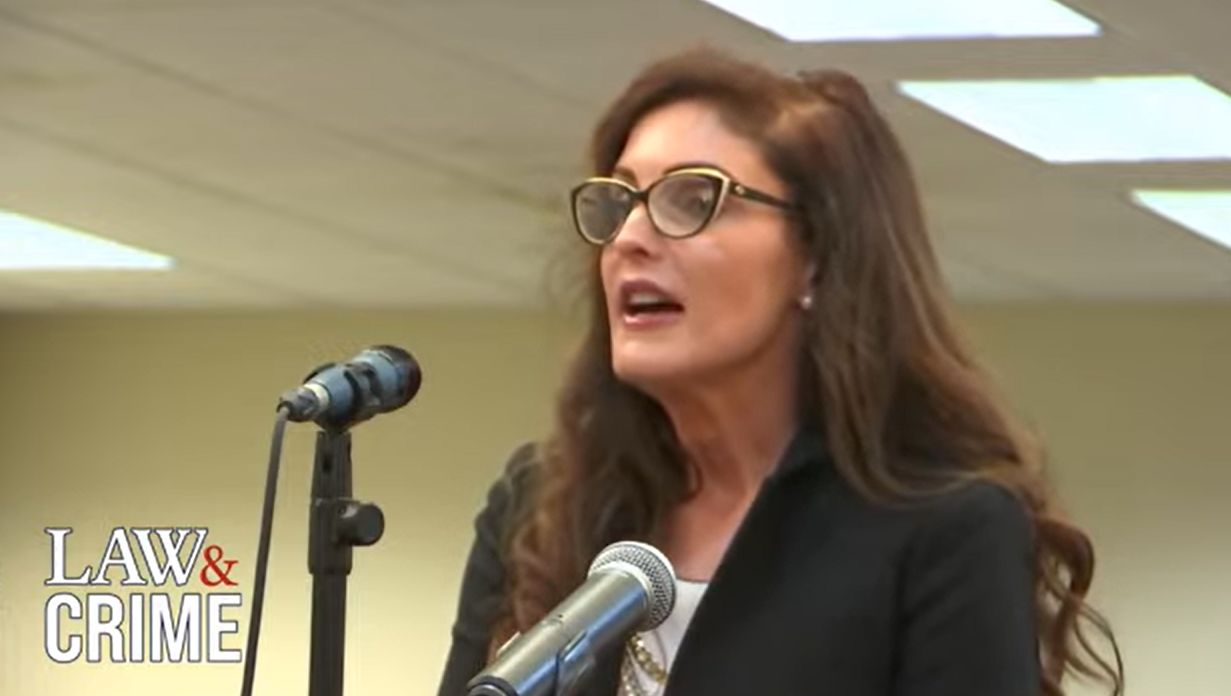
On redirect, Todd asked Clark if he came to his conclusions to a reasonable degree of medical certainty, and he said yes. She asked who was answering his questions, to which he answered that Carly did.
He said an accurate or appropriate evaluation is critical to his work, so he was careful.
Based on his experience, Clark told Todd that it’s not uncommon for people who have had traumatic experiences feel somewhat dissociated, and that he had not explained the term “disassociated” to her.
Carly had been on Abilify for five months when he interviewed her, Clark said.
None of the testimony from Gregg’s friends changed his mind on her ability to tell right from wrong, Clark told Todd. She also didn’t seem to remember how she got into a drainage ditch after she killed her mother, he said, and of course she would have known something was wrong, he said.
Todd asked Clark if a law enforcement officer is arresting a child, is it a logical conclusion for a child to believe they’re in trouble? Clark said yes.
Asked if he recalled some of Gregg’s father’s medical records. He had been prescribed Thorazine, which is an anti-psychotic, he said. He was also taking antipsychotics called Risperdal and Zyprexa. He had been hospitalized as well, Clark testified.
Clark testified that a person doesn’t always know if they’ve lost time, especially if they have no memory of it.
“Some people are aware that something has happened and some aren’t very aware at all,” Clark said.
Gregg was afraid that her mother would find out that she was having mental health issues, so it would make sense that she might not disclose some things to her health care practitioners who might also be speaking with her parents.
Todd pressed Clark on whether Gregg met the criteria of someone who was dissociating and again he said that she met most of them with the exception of the patchy memory.
“I wouldn’t put too much stock in this whole thing, this is information that we have from the research there is and it’s not great research,” Clark said. He agreed that her dreams after the incident in which she heard gunshots could point to having patches of memory.
Todd asked if Gregg could have assumed something had happened once she was taken to the scene and was surrounded by law enforcement. He said yes.
Defense rests.


